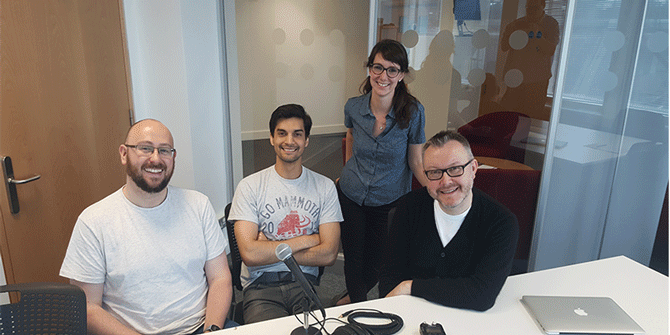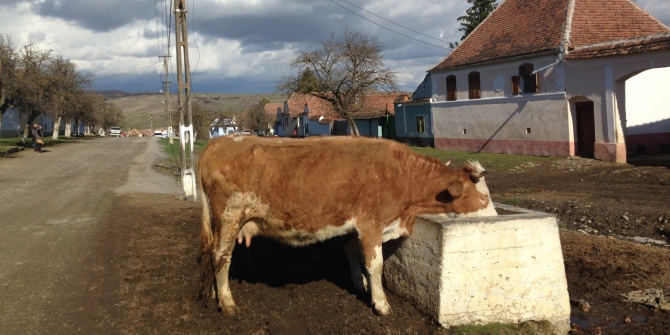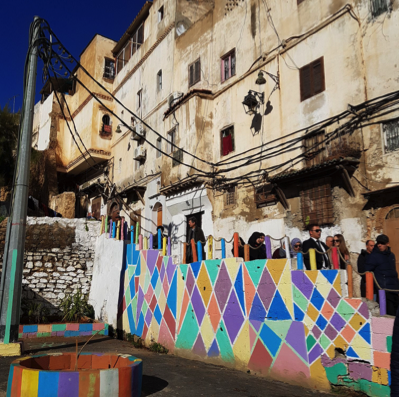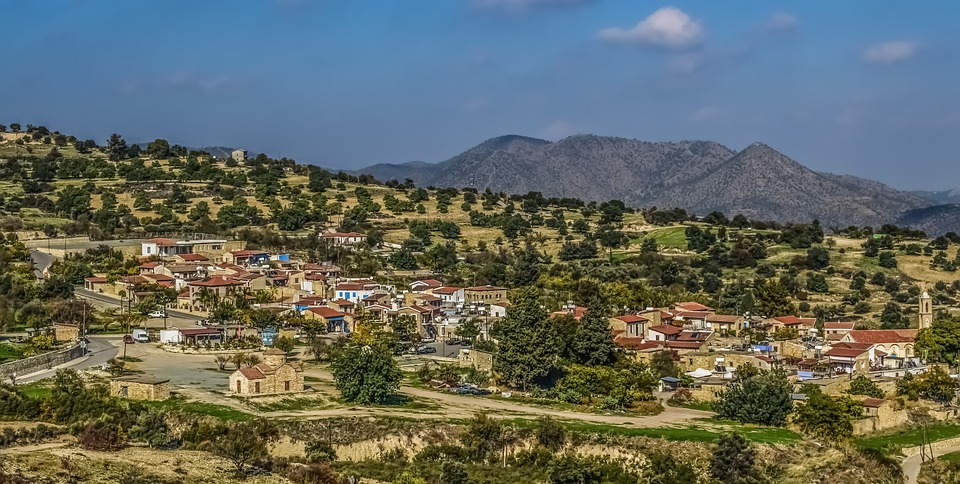As Professor Sandra Jovchelovitch prepares to travel to Quito to participate in Habitat III, current and former postgraduate students reflect on their experience of travelling to Brazil to observe first-hand how socio-cultural psychologists research and work in complex urban environments.
 ‘Resilience and Porosity of City Borders: A psychosocial investigation in three Brazilian cities’ is an international interdisciplinary collaboration project studying the relationship between the porosity of internal city borders, self esteem and resilience. The project aims to examine the role of bottom up development initiatives in building resilience and enhancing the flexibility of city borders in segregated neighbourhoods, or favelas, and underground socialibilities in Porto Alegre, Sao Paolo and Rio de Janeiro.
‘Resilience and Porosity of City Borders: A psychosocial investigation in three Brazilian cities’ is an international interdisciplinary collaboration project studying the relationship between the porosity of internal city borders, self esteem and resilience. The project aims to examine the role of bottom up development initiatives in building resilience and enhancing the flexibility of city borders in segregated neighbourhoods, or favelas, and underground socialibilities in Porto Alegre, Sao Paolo and Rio de Janeiro.
Principal investigators on the project Professor Sandra Jovchelovitch and LSE PhD graduate Dr Jacqueline Priego (currently Research Fellow in Bournemouth University), and Professor Gareth Jones and Assistant Professor Ryan Centner from the Department of Geography and Environment formed the research team from the LSE. As part of a capacity building initiative, 5 postgraduate students from the Department of Psychological and Behavioural Sciences and the Department of Geography and the Environment also travelled with the research team to Brazil.
Haani Mazari, MSc Social & Cultural Psychology graduate, summarised her experiences traversing different spaces in Rio:
“Brazil is often romanticised as a place of beautiful beaches, models, and football. Yet what I will remember of Brazil is the pride that Brazilians share in their country and culture. In Rio de Janeiro the quaint Favelas colour the hills and are at one with the landscape. We were lucky to go beyond viewing the Favelas from afar and explored two Favelas in the north of Rio. A favela-dweller asked to take a picture with me when he heard that I am from Pakistan. He told me, “Your country is like mine.” I agreed with him to an extent. However in my hometown, Karachi, there is minimal interaction between the various segments of society. What I found to be the most enchanting about Rio was how, despite social inequalities, there seemed to be a meeting point at which society interacts. We went to a Samba club that was frequented by locals of diverse racial and socio-economic backgrounds. Yet everyone swayed to the same rhythm and sang the same lyrics. The physical space in the South of Rio is unreachable to many, yet the vivacious realm of Samba is open to all.”
From left to right: Celestin with recycling centre staff in Porto Alegre; View of Complexo do Alemão from cable car; Haani and Geetha on a site visit in the 4th district in Porto Alegre.
This research-intensive trip included a workshop in Porto Alegre and a visit to a number of potential field sites in Porto Alegre and Rio. It was a rare opportunity for postgraduate students to engage with senior faculty on an international research project and gave the students first-hand experience of research-led teaching, where learning could happen in the field.
Celestin Okoroji, MSc Social & Cultural Psychology student at the time and now a PhD student at the Department of Psychological and Behavioural Sciences, spoke about his experience engaging in academic environments outside the LSE:
“We often have visions of the lone genius working up the latest theoretical revolution, alone, in a dusty room, with dim lights. Fortunately, that doesn’t seem to be the case, at least in this project, skills of communication and negotiation seem just as important as theoretical knowledge or academic understanding. I came to realise then, that academia is not a solo career. Also, having had the opportunity to visit some potential research sites and interact with the people there it became starkly apparent that there really is very little comparison between context, culture and action in a Brazilian favela and in London, even on the estates. As social scientists, having some opportunity to work internationally really brings home the understanding that universal laws aren’t everything! Actually, anything you could formulate into a universal law of human behaviour or sociality probably wouldn’t be that interesting. Finally, it can feel like academics, especially at a university like LSE, are larger than life. To be involved in a research project and spend some time together, both formally and informally, you realise that they are just people too, intelligent, very experienced, but people nonetheless, with foibles and failings like the rest of us. If you think you need to be perfect to fit in, you don’t!”
From left to right: Dr Priego conducting a research methods session during the workshop; Santa Rita de Cassia (photo credit – Dr Ryan Centner); Prof Jovchelovitch, Dr Priego, Mara and Maria-Cecilia fielding questions during the workshop.
Geetha Reddy, 4th year PhD Candidate in the department, found the opportunity to be inspiring, and drew parallels between her own PhD research project and the ESRC-CONFAP funded project:
“While postcoloniality in Brazil is different from Singapore and Malaysia, and multiculturalism manifests in a varied forms in the 3 countries, I am interested in understanding how porosity of boundaries, both physical and metaphysical, influence how individuals negotiate their ethnic identities, and the impact this has on their self-identity. I found that looking at how physical boundaries in the favelas in Rio, and the 4th District in Porto Alegre, influence the building of resilience among communities and individuals helped me to probe deeper into how housing quotas in Singapore and Malaysia challenge individuals’ construction and maintenance of ethnic identities. I am also focused in exploring how identity is communicated to individuals through governmental and social discourse, and found that individuals in both Brazilian cities resisted the dominant discourse around spaces they lived and worked in, and contested the meanings that different spaces held for them. As the research project develops, it would be interesting to discover how barriers to communication between different communities in Brazil influence social capital, social networks, self-esteem and perceived qualities of life. On a broader scale, there’s much to learn from understanding how porosity of borders impacts the agentic self.”
It was an eye-opening experience for the students who are interested in issues of community, social exclusion, representations of inequality and social change, and the opportunity to network, discuss their own research with and learn from Brazilian postgraduate students, academics and social organisations was invaluable. We would also like to take this opportunity to thank our hosts from Porto Alegre, especially Professor Simone Mainieri Paulon and Professor Pedrinho Guareschi from the Institute of Psychology at the Federal University of Rio Grande do Sul, representatives from CUFA and UNESCO who made the field trip a success.
Photo credits: Geetha Reddy (unless otherwise specified).
 Celestine Okoroji is a 1st year doctoral candidate at the Department of Psychological and Behavioural Science at the LSE, supervised by Professor Sandra Jovchelovitch. After graduating from Brunel University with a degree in Psychology, Celestin took up a position on the National Graduate Development Programme (NGDP) at Islington Council. The NGDP is a highly competitive 2-year graduate scheme for local government, seeking to fast track new talent into senior management. Whilst at Islington he worked in a number of roles including Corporate Strategy and Policy, Alternative Education provision, Youth Offending and Community Safety. Leaving Islington after 3 years in 2015, Celestin took up an MSc in Social Psychology at the London School of Economics and Political Science, where his MSc research focused on the interplay between unemployment and inequality.
Celestine Okoroji is a 1st year doctoral candidate at the Department of Psychological and Behavioural Science at the LSE, supervised by Professor Sandra Jovchelovitch. After graduating from Brunel University with a degree in Psychology, Celestin took up a position on the National Graduate Development Programme (NGDP) at Islington Council. The NGDP is a highly competitive 2-year graduate scheme for local government, seeking to fast track new talent into senior management. Whilst at Islington he worked in a number of roles including Corporate Strategy and Policy, Alternative Education provision, Youth Offending and Community Safety. Leaving Islington after 3 years in 2015, Celestin took up an MSc in Social Psychology at the London School of Economics and Political Science, where his MSc research focused on the interplay between unemployment and inequality.

Haani Mazari has grown up in Karachi, Istanbul, Dubai, Singapore and London. Her interests lie in identity politics and, in particular, how individuals react to stigmatisation and social exclusion. She has completed her MSc in Social and Cultural Psychology. For her MSc dissertation, she explored Pakistani identity and the exclusion of religious minorities.
 Geetha Reddy is a 4th year doctoral candidate pursuing a PhD in Psychology at the Department of Psychological and Behavioural Science, supervised by Dr Ilka Gleibs. Her research focus is on diversity and multiculturalism, researching ethnic identity constructions and negotiations among individuals in Singapore and Malaysia. Her other research interests include perspective taking among individuals, the socio-cultural determinants of health related behaviour as well as safety culture within public health systems.
Geetha Reddy is a 4th year doctoral candidate pursuing a PhD in Psychology at the Department of Psychological and Behavioural Science, supervised by Dr Ilka Gleibs. Her research focus is on diversity and multiculturalism, researching ethnic identity constructions and negotiations among individuals in Singapore and Malaysia. Her other research interests include perspective taking among individuals, the socio-cultural determinants of health related behaviour as well as safety culture within public health systems.
 Maria Cecilia Dedios Sanguineti is a 3rd year doctoral candidate pursuing a PhD in Psychology at the Department of Psychological and Behavioural Science at the LSE, supervised by Professor Sandra Jovchelovitch. Her doctoral work explores the intersubjective processes fostering resilience among vulnerable youth in two socio-cultural contexts (Colombia and the UK). Her research focuses on psychosocial development during adolescence and young adulthood, and how this process unfolds in different socio-cultural contexts.
Maria Cecilia Dedios Sanguineti is a 3rd year doctoral candidate pursuing a PhD in Psychology at the Department of Psychological and Behavioural Science at the LSE, supervised by Professor Sandra Jovchelovitch. Her doctoral work explores the intersubjective processes fostering resilience among vulnerable youth in two socio-cultural contexts (Colombia and the UK). Her research focuses on psychosocial development during adolescence and young adulthood, and how this process unfolds in different socio-cultural contexts.
 Mara Nogueira is a 4th doctoral candidate in Human Geography and Urban Studies. She is supervised by Dr Hyun Bang Shin in the Geography and Environment Department at LSE. Her doctoral research in about the urban everyday politics of the World Cup in Belo Horizonte/Brazil. The work analyses how different groups affected by the mega-event preparation in the city organize to engage with the State and claim their rights.
Mara Nogueira is a 4th doctoral candidate in Human Geography and Urban Studies. She is supervised by Dr Hyun Bang Shin in the Geography and Environment Department at LSE. Her doctoral research in about the urban everyday politics of the World Cup in Belo Horizonte/Brazil. The work analyses how different groups affected by the mega-event preparation in the city organize to engage with the State and claim their rights.










